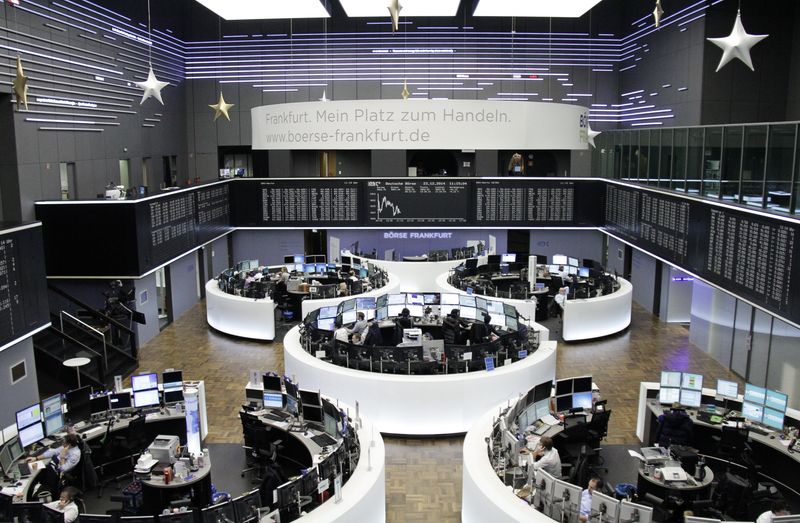By Sinead Cruise, Huw Jones and Samuel Indyk
LONDON (Reuters) - Top stock exchange operators in Europe are under pressure from some investors and brokers to trim and simplify their fees to build a deeper capital market that challenges Wall Street's allure to new company listings.
The European Union has long sought to make its fragmented capital markets more efficient, with Britain also trying to find new ways to attract big-ticket IPOs since Brexit.
And while there has always been a healthy tension between exchanges and their users over fees, more than 10 brokers, investors and analysts interviewed by Reuters said Europe's main operators now needed to act to entice investments.
"If you can improve or reduce the costs of execution in the market, then that has a huge effect potentially on boosting turnover and investability," said Ben Springett, head of European electronic and program trading at Jefferies.
Illustrating the problems facing Europe, the Association for Financial Markets in Europe (AFME) said IPO issuance in the region fell 72% year-on-year to a record low in the first half of 2023, and was headed for the lowest annual issuance volume since 2011.
Britain's biggest chip company ARM opted to IPO in New York this year after building supplies firm CRH (LON:CRH) shifted its main listing to the United States.
Meanwhile, a BMLL Technologies study shows notional U.S. trading volumes grew more than 2.5 times the European rate between 2018 and 2023.
Market liquidity is a critical consideration when choosing an IPO venue, with healthy trading volumes offering ideal conditions, said Nate Palmer, President of investment and trading platform Moomoo Financial Inc.
But complex and varied fees are "major disincentives to invest for many middle-class and working-class Europeans," said Samuel Gregg, a Political Economy fellow at the American Institute for Economic Research, as many see the market "as a rich person's game".
The operators argue their fees are already straightforward, with Deutsche Boerse (ETR:DB1Gn)'s Head of Market Analytics and Pricing Andreas Heuer saying its model is "quite simple".
Euronext, which operates exchanges in Paris, Amsterdam, Brussels, Lisbon, Dublin, Oslo and Milan, has already made progress in simplifying fees, said Simon Gallagher, Head of Global Sales for Euronext and CEO of Euronext London.
And a spokesperson for London Stock Exchange Group (LON:LSEG) said standard pricing on its primary exchange was publicly available and based on value traded within a banded structure.
AUCTIONS
Fees during closing auctions, a key trading window that only primary exchanges can operate, are under particular scrutiny. These bring buyers and sellers together in the final five minutes of the day, establishing a final price for stocks.
Aquis Exchange estimates around 2 trillion euros ($2.2 trillion) of trading takes place annually in Europe during closing auctions, which are "particularly lucrative" for primary exchanges.
While popular among exchange-traded funds and other investors needing official end-of-day prices to rebalance and value portfolios, the higher fees are making some high-turnover, low margin hedge fund strategies increasingly unviable on some European markets, sources told Reuters.
Data from Rosenblatt Securities showed a record 17.4% of total European equity trading took place during closing auctions in September, while intraday volumes are falling, accounting for about 33% of volumes.
Euronext's Gallagher said it charged a very small number of clients higher fees to trade in closing auctions compared with the rest of the trading session.
SIX Swiss Exchange, which runs the Swiss and Spanish bourses, also charges more during closing auctions. Joerg Schneider, spokesperson for the firm said they were "an important liquidity event" with "a relevant weight of daily trading volumes executed during the window allowing members to benefit from enhanced liquidity".
Reuters was unable to determine which, or how many, SIX or Euronext users were subject to higher charges.
A paper published in June by the University of Melbourne, supported by the Plato Partnership of asset managers and broker-dealers, said closing auction fees on primary exchanges ranged from 0.2bps to 0.95bps, with some also charging a fixed 'per message' fee.
While they do not impose closing auction surcharges, LSEG and Deutsche Boerse could offer clearer structures to attract more investors and support liquidity, sources said.
Thomson Reuters, the owner of Reuters News, has been a shareholder in LSEG since 2021. LSEG also pays Reuters for news.
A spokesperson for the World Federation of Exchanges said "complexities of price structures vary significantly and are influenced by a multitude of factors".
AFME declined to comment. Britain's Financial Conduct Authority did not respond to a request for comment.
While others like Aquis and the Chicago Board Options Exchange have launched alternatives to closing auctions, liquidity and execution can be less predictable.
Users of these alternatives, known as Multilateral Trading Facilities (MTFs), could pay fees of between 0.075bps and 0.3bps, or a monthly subscription, the University of Melbourne study found.
While MTFs had grown quickly since the pandemic, they still only accounted for between 5.5%-8.5% of on-venue trading activity during the close, said Will Hadfield, European Market Structure Analyst at Rosenblatt Securities.
"If you need to sell 5 million euros of BMW stock, you might want the certainty you're going to get the transaction done so you stick it in the closing auction on Deutsche Boerse."
European trading costs are often higher and more complex because exchange groups and clearing houses face duplicate regulatory, real estate and tech expenses in the countries they operate in, sources said, making change harder.

"When you consider what drives healthy markets, competition and so on, these situations don't help," Springett said.
($1 = 0.9168 euros)